#our elves are better
Explore tagged Tumblr posts
Text

Every question in the Elder Scrolls universe has one answer: The Dwemer 🤣
#the elder scrolls#Skyrim#Morrowind#Oblivion#our dwarves are better#our elves are better#our steampunk is better
13 notes
·
View notes
Text
It is really fascinating to study the evolution of the “Our elves are better” tropes (TV Tropes and Idioms terminology) in fantasy literature. You can easily track down the evolution by two fantasy book moments.
J.R.R. Tolkien’s Lord of the Rings - the protagonists’ friendly night chat with Galadriel in “The Fellowship of the Ring”. This moment has been used and reused a LOT throughout websites and Youtube video essays and blog posts recently due to the resurgence of the Lord of the Rings fame - so you might have heard about it.
Up until now, the elves seemed for the protagonists of the story “magical”. After all they are ethereal, impossibly beautiful and graceful nearly-immortal beings, who are able to hide from the sight of regular beings their dwelling, seem to work with treasured magical artifacts everyday and have wonderful explainable ability such as reading the minds and hearts of people...
But as Galadriel explains to the characters (and to us by extension) is that for the elves, what they do is not “magic” or at least “true” magic, because for them it is all natural - and in fact, all those wonders and marvels are indeed part of a “natural process”. They are the results of an extremely long time of studying and perfecting various skills and crafts, much more time than other species in Middle-Earth had since the elves are the oldest mortal beings of the world. They are the results of literaly a civilization so advanced, and helped by natural abilities that other species are deprived of, such as a form of telepathy, that it looks like they are doing “magic”, such as seeing glimpses of the future in a pool of water, when in fact to them it is all just an art, a craft, a technique that was refined and practiced throughout millenias and generations until reaching its most advanced form. This is one of the original fantasy examples of “Any science can become magic when it is advanced enough”. The cloaks that make a perfect camouflage, the boats that never sink, the ropes that untie themselves at extremely convenient time and with a suspicious ease - they are not the product of any true enchantment or spell, even though they look like supernatural. They are just extremely advanced craft.
But then cut to the very first book of the very popular Riftwar Saga by Raymond E. Feist, “Magician”. And when the elves are first introduced to the protagonist and explain to him about their “marvels” and “wonders”... The protagonists literaly say “Oh yes, this is all magic. We have magic running through us, we make everything we touch magic, we are just so magical, and this is why our items and crafts and talents are better than those of humans. This is why our boots are more silent, why our bows never miss. It is because when we make them, they just become magical because it is us that made them.”
This shows extremely well how the idea of “elves are better than humans/other species” evolved from Tolkien’s subtle and refined take “It looks like magic, but it is all just very advanced craft and technology”, to the misunderstood and then massively spread and popularized “Elves are magical and so are their creations”.
5 notes
·
View notes
Text
I've referenced before how I have a big google document to keep track of every media I've ever seen in my entire life (just for reference because I like to track everything possible lol… I am the Data Collector), but recently as I was updating it, I thought of actually evaluating them to find out random percentages (like for example, out of Total Shows Watched, what percentage did I finish vs. stop watching, what percentage did I like or dislike, etc.)...
Evaluating these things is made easier by the fact that I already place everything on each subsection of the list into 6 broad ranking categories, so I don't have to go back and guess to figure out how I feel about them or anything. The categories are: Ranking 5 - overall best* (despite some criticisms of course because I'm too much of an Analyzer to ever find anything Perfect lol) Ranking 4 - more positive than neutral, but not good enough to be 5 Ranking 3 - either the good + bad negate each other, OR it's just not memorable/interesting in any way enough to be ranked higher or lower (this is the Default category ALL things are placed in if no other rank applies) Ranking 2 - maybe a few redeemable elements but largely more negatives than positives Ranking 1 - So bad that it circles around to being fascinating to observe in some way (not necessarily Funny, or Good, but just interesting somehow) Ranking 0 - Bad in a genuinely frustrating or obnoxious manner
*("best" primarily defined here as most interesting, rather than most good in a technical sense, or some other measure. I tend to value more highly whether there's something novel or thoughtful about the worldbuilding, tone, writing, base premise, etc - than about whether it's actually executed perfectly.)
And here's the amount of shows that have so far been placed into each category -
TV shows ~ Rank 5 (highest) - 20 shows ~ Rank 4 (mid-high) - 28 shows ~ Rank 3 (neutral/default/meh) - 114 shows ~ Rank 2 (mid low) -33 shows ~ Rank 1 (low low but intriguingly so) - 14 shows ~ Rank 0 (iredeemably low) - 2 shows
This would make for a total of 211 TV shows overall. However, there are 57 shows within these list marked as "didn't finish" (typically meaning I quit on the very first or second episode - but log them still to keep a record that I at least had a brief view of them).
So my total of genuinely fully watched shows would be more 154. 211 Total, but a More Accurate Total of 154.
Counting them all and using the Total Number Of The List (211) -- that means roughly 9.5% of all total shows I have ever watched (or at least attempted to watch) have been Mostly Good, 13% have been Moderately Okay, 54% have been either entirely Forgettable or some mix of good + bad that lands them right in the Neutral Middle, 15.6% have been Mostly Bad, 6.6% have been Bad (but in an interesting way), and 0.9% have been Terribly Bad.
Additionally, I didn't even get past the first two episodes of about 27% of the total.
Sooo, discounting ones I didn't finish, my total TV shows ever watched in my life would be about 154 (maybe give or take a few, assuming I might have forgotten some from very long ago).
But instead of entire life, let's just say this is the total for 'About 20 Years' (so, not counting very early childhood when I likely wouldn't remember things I saw/have no detailed recollection of them (like for example, I'm sure at some point when I was like 4yrs old I must have seen an episode of Spongebob or something, but I have zero distinct memories of it, can't quote anything of it, and barely recall the premise - so I don't count it on the list, etc.)).
In that case, 154 divided by 20 would be roughly 7.7 shows a year.
Which is actually surprisingly low considering that I often have stuff on in the background for hours whilst I make sculptures and do costumes and stuff (maybe I should have also marked some distinction between 'things I fully paid attention to' and 'things I kind of half listened to whilst sculpting', but that would further split the categories too much probably lol), but I guess a lot of that is youtube videos or random documentaries, so .. eh.. maybe I get it being lower.
Now, doing the same thing for movies-
Movies ~ Rank 5 (highest) - 4 movies (3.4% of total) ~ Rank 4 (mid-high) - 12 movies (10.3% of total) ~ Rank 3 (neutral/default/meh) - 91 movies (78.4% of total) ~ Rank 2 (mid low) - 8 movies (6.8% of total) ~ Rank 1 (low but interesting) - 1 movie (0.8% of total) ~ Rank 0 (irredeemably low) - none in this category (0%)
That makes 116 for a Total (Actually Remembered) Movies Watched In Lifetime (Or At Least In 20 Years).
116 divided by 20 is roughly 5 or 6 movies a year (I feel this has probably been skewed though by adding everything since like elementary school onwards, as I remember a lot more movies from child/teen years.. Whereas, the past 3 years I feel like I've barely seen maybe even 5 movies?? lol). I also have "Didn't Finish" marked on 18 of them. Which means I quit halfway through about 15% of the total movies.
So, a for broader summary stuff..
I seem to be less forgiving to movies than tv shows, by far. Which makes sense to me, I guess, because I love elaboration and details, so "short form" things that only last an hour or two are often lost on me a bit. My biggest complaint with movies is indeed usually walking away just wishing there had been more exposition, more scenes where characters are doing nothing, more "mindless bantering" conversations, more Quiet Downtime and Lore Elaboration and so on lol, so... of course most 1-2hr films end up feeling a bit Not Enough To Draw My Interest/Nothingy to me.
If you count 5 and 4 as "like" and rankings 2 to 0 as "dislike", then for TV shows I at least somewhat liked 48 of them, and at least somewhat disliked 47 of them.. So it's almost exactly the same lol. I'm just about equally as likely to find something bad as I am to find something redeeming about it. But overall, the largest chance is that I just won't really care much for it at all and it will be tossed into the 'neutral' pile, forgotten forever. Movies have a bit better of a balance, "liking" 16 of them, and "disliking" only 9 of them. So I'm slightly more likely to enjoy a movie than to find it annoying - though still VASTLY more likely to just not find it anything in particular, possibly not even finishing it.
ANYWAY.. this is vague and literally pointless, but like I said, I just really find information fun. Like my document where I've rated every apple flavor I've ever tried (like 40 of them now?), or reviewed every oreo flavor (32?), or ranking data from my entire 10 years of Trying To Make Friends process (out of 100 people, roughly 8% chance of a moderate compatibility, 3% chance of high), or etc. etc.. I love to have random pointless things to analyze I suppose lol.
I doubt anyone tracks things in their life in this same exact way, but I'd be interested in hearing any at least somewhat similar data !!! (like, how many TV shows you watch a year on average, and what percentage of those you like vs. dislike (if you keep track of that sort of thing), etc.)). I guess it might be easier with movies, since I think some people use those websites where you curate a list of movies you've seen and you can rate them or something, so maybe the numbers are already available on those places. :0
#maybe this is my version of spotify wrapped lol.. Lifetime Media Google Doc Wrapped.. kind of.. except I'm not going over specific titles.#I can't do this with music since I rarely EVER look for new music or add to my Youtube To MP3 folder library as I just don't really#listen to music that often. When I'm working (the majority of when I seek background noise) I need like.. people's talking voices#for some reason. Just instruments and singing are not distracting enough to me to work as background noise because theyre#almost TOO in the background if that makes sense? like if I put music on then I just tune it out and it's virtually no different#than if I were daydreaming stream of consciousness thoughts in an entirely quiet room lol. And I can't really do it with books since#essentially 100% of what I read is non-fiction. usually about some specific subject or academic topic OR stuff like#1800s magazines or cookbooks or historical people's diaries. Which is not really.. the type of thing I would#rank as easily I guess? like 'ooh yeah putting the sociology textbook in my top 5 hee hee right next to the 1920s radio recipes book' lol.#Then for games... I just sadly dont play enough of them. I've been banned from new games as I've told myself I cant play anyting#long form (no rpgs or etc) until I actually finish MY OWN game first - to keep me from wasting time. so on average#I play... 0 new games a year. ToT... I do play the sims sometimes but that's really all (which is not a new game at all since#I've been playing it on and off for years). Thus I guess movies/TV are really the only things that make sense#to collect this sort of information on. I could do youtube videos I guess also but that seems kind of strange like...#giving a rating to every single video I watch in a ranked list lol.. Especially since I would say a good 85% of the time#they are exclusively background noise whilst I'm working on something or cleaning the house or etc. and not things I pay serious attention#to. There are only a few specific topics/types/creators of videos I watch where I'm ACTUALLY sitting in front of a screen paying#direct attention to the content (usually when it's educational or political things). Everything else is too mindless to even rank.#ANYWAY... ever analyzing my little hermit Weird Relationship To Media (in the sense of seemingly not processing or getting the same#things out of it as many other seem to). I think that can contribute sometimes to the whole difficulty socializing and stuff#since our culture is very centered around media consumption generally speaking. People want to talk about The New Movie that came#out or The Big TV Show Of The Year. and for me it's like.. highly likely I just plain have NOT seen it. Or if i have. statistically#I most likely was entirely ambivalent if not slightly negative towards it lol. Which just kind of takes the steam out of a 'fun' 'casual'#conversation and you seem like a bit of a bummer if most of your only feedback is either 'idk what that is' or 'oh yea... i did#see that one.... i didnt like it all that much though... I think it'd be better with elves in it.. and 7 hours longer..'' lol..#Which I am not disliking things in a 'grr i hate it bc its popular'/just to be contrarian way. I actually dislike that mindset/find it#silly (by striving so hard to be counterculture you are thus still defining yourself by the whims of external culture - just in the#opposite direction. but are still just as preoccupied with the mainstream (going against it) as everyone else. etc. lol..)) In my#case I think it IS just having niche hyperspecific tastes.. for example- it peeves me when cell phones are in media bc I dont want to be#reminded at ALL of the real world. so.. cross off anything set in modern times. so on & etc. Judging all things by these weird criteria lol
12 notes
·
View notes
Text
Bellara lowkey pissing me off with all this feeling guilty bs
#vague spoilers in the tags so dont read em if you havent played yet#but feeling like the elves need to apologize for this shit?#are you KIDDING ME#genuinely fuck that#out of everyone in Thedas the elves got screwed over the most (arguably) and she wants us to APOLOGIZE?#like first of all theyre not our 'gods' so lets just put a stop to that entire rhetoric immediately#they betrayed their own people. ELVES.#and then Mythal's actions led to everything else that followed#including humans even further fucking over elves#so what exactly are the elves meant to apologize for?#Sorry for being so enslaved & betrayed by literally everyone so hard that it ruined the world for all of us?#yeah fucking SORRY I GUESS.#anyway she better cut that shit out i dont wanna hear such nonsense again#elves are gonna have enough bs to deal with im sure after all this is over#dont need to add pressure of feeling like the elves OWE something to the modern world who would rather just see them extinct#i cannot overstate how furious that sentiment makes me#meanwhile neve pissing me off too over here like ''i dont expect you to care about dock town''#okay fuck you too?#Treviso literally had no one#Minrathous had the shadow dragons#and not to put too fine a damn point on it#but (naturally) im playing as an elf#and not that i LIKE the idea of the Venatori seizing control#but just like super honestly in the grand scheme of things#i have no love for Minrathous.#and yet still have i not been willing to help? but she doesnt want to talk about that.#she claims to understand that i had to make an impossible choice and yet still she punishes me for it.#THE FACT SHE WONT HEAL ME IN BATTLE IS WILD BTW#anyway. thanks for coming to my ted talk#things are going much better with the other companions
9 notes
·
View notes
Text
I don't care if it's been a whole year, the LIs better be still looking for mc. They better be searching all corners of the Light realm for a way to find us
#I want them to be haunted by our memory#I want Imtura to be searching the seas#Nia talking to all the Light mages and reading all#Their books on the shadow realms#Mal to search all the caves and ruins for any artifacts#And Tyril to be searching the ancient elves knowledge#In Undermount#If they're close to moving on#And we have to spend all 2nd book trying to#Rekindle the flame#I'm screaming#Imtura better not gotten anyone pregnant#While I'm gone lol#bolas#choices#pixelberry#playchoices#bolas 2#blades#blades of light and shadow#blades 2#Blades of light and shadow 2
36 notes
·
View notes
Text
alright so now that we’ve gotten some actual crumbs, it feels like it’s a good time to lay out my prediction for what da4 is going to look like. writing this in a letter and mailing it to myself
we are part of an underground organization formed from the ruins of the inquisition to stop solas from ending the world
meanwhile the wardens have been researching the blight/the location of the archdemons and discover some secret about the location of the black city/what is actually contained in it
we’re supposed to be shocked at the reveal that the evanuris are trapped in the black city and the maker doesn’t exist
the ancient elves were in control of some crazy mutating technology (like in hormak) and that was the original source of the darkspawn. the whole thing about them being from the deep roads and a dwarf concern was actually just a red herring, they’re just underground because they’re powered by lyrium and this has ALSO been an elf thing the whole time :)
anyway, now we need to Double Make Sure the veil stays up because the evanuris have something even worse cooking up in the black city and we need to prevent them from unleashing a super blight and destroying all life, and our job is to convince solas to give up, not because we disagree with his plan but because his actions will have unintended consequences. even if he doesn’t care about everyone else and wants to rebuild the world, he won’t even be able to do THAT because the super blight will kill elves too. so although we WERE enemies we will have to band together to defeat the greater threat etc. it will be optional to recruit him as an ally/advisor, or you can just fight him directly and take control of his forces
we will have to cross into the fade AGAIN and storm the black city directly to put a stop to whatever’s going on in there
#i feel fairly confident about this but i hope i’m wrong honestly.#i’m a little disappointed that it’s probably going to turn out to be ‘elves are the most important people and also the cause of everything#and their lore is the Correct one’#i hope to god that they give you the option to fight him and don’t just force you to make nice for no reason lol#ESPECIALLY if this is a new protagonist with no history with him#it’s pretty much the same formula as inquisition and origins. two-step problem where the thing we initially set out to fix turns out to be#the least of our problems and we’ll need to put aside our differences for the greater good#it will probably also come out that the tevinter gods are also an elf thing. like how flemythal can turn into a dragon#and then the archdemons were the original hormak style experiment. or something#and we won’t have an explanation for the maker bc that’s just humans being silly. but see everything has a neat scientific explanation :)#or maybe the maker is like. elgarnan in disguise lmal#i am perhaps being a little ungenerous but also. i feeel in my gut that this is what they’re planning#mine#dragon age#da4#ghilannain feels like a possible candidate bc of the lore abt how she created halla. but there was that trailer with a mans voice#so it will probably be elgarnan because he’s the head of the pantheon especially now that mythal is gone#GOD i hope that comes up#they’re pulling so much from trespasser. a dlc that wasn’t even the main game and lots of people may not have played#they’d better reference the stinger ending of the actual game and give some resolution to that#maybe it’s going to be like. solas’s plan to take care of the evanuris when the veil comes down is to just absorb them#but we need to convince him that they’ve had time to set other contingencies up so even that won’t stop whatever they’ve started
15 notes
·
View notes
Text
Clearly someone on the Veilguard writing team thought that they can just drop "Dalish settlements" into a conversation and act all casual about it.
But guess what, fuckface? I've been thinking about it for the past 12 hours.
#I am very early in the game so far#and Veil Jumpers being our primary window into the lives of the elves of northern Thedas fills me with frustration and longing#when did the organization come about? how numerous are its members? how integrated are they with the dalish?#how did they learn of the evanuris' true nature? what do they do with the artifacts they collect? what long-term goals do they pursue?#I really hope that there are answers further in#this 'new' Thedas is both exciting and frustrating for someone who spent quite a lot of time obsessing over da lore in the past 12 years#dragon age#dragon age vielguard#I really don't think that this is in any way a spoiler#but I suppose better safe than sorry#veilguard spoilers
5 notes
·
View notes
Text
[chantry voice] magic is bad so we'll get our paramilitary order (the templars) devoted to controlling mages addicted to a substance that helps mages do more magic so the templars can use magic lite to dispel magic
#fuck the chantry#tbh#i havent seen absolution so i cant speak to anything they do in tevinter#but in orlais and ferelden and the free marches the chantry is so a) violently awful and b) hypocritical#'spirits bad except when we use one in our rituals'#'magic bad unless we get one of our paramilitary religious orders hooked on drugs that give them magic lite to better fight magic'#can't forget the opression of mages#or the fact that historically the chantry was violently racist towards elves and still is racist#anti chantry#dragon age
16 notes
·
View notes
Text
.
#had a dream last night where me and my friends were wanted and hunted#and Halsin was part of the team#and I think there were a OT of elves trapped#*a lot#and me and my team saved them#and helped them stand up to the slaver that captured them#and we were on the run#I don't remember the entire thing but#long story short#I got a call from my dad that was also on the run#and that had some superpowers I think? and he was helping me?#and in case they got to him or to me#I told him that I love him#I don't think this grief is going away tbh#my mind still trrows me in there#me after my parents' death#personal#funny enough#I slept better last night than I slept the night before that#usually I'd say having a dream of my fav fictional character is way better#but of course some horror has to be mixed in with those dreams#idk man#our brains are weird
1 note
·
View note
Text
not to be a hater but i'm not excited
#yes this is about da4#thinking about it once again cause it's my whole entire dash now#i am glad for any of yall that are happy though#i'm just... exhausted#and really hoping the graphics are better than... that...#but it's cool if not; i do have a lot to do in bg3 and i am happy to just play that a mil times instead lol#it's just disappointing if that's the look they're going for imo#i'm also just... not looking forward to seeing more discourse about elves and templars and mages and fantasy racism etc#DA loves to go all in with that and now that i'm old(TM) it just makes me feel like ben affleck smoking#a big part of me is sitting here like... let it die!! let's just move on it'll never be the same or live up to our expectations#i don't even want to see any references to anyone we came to love in the 1st 3 games#unless i get to specify what I did in my saves or transfer saves which lol not gonna happen#also it's been so long i barely remember what half of the companions were like at this point#outside of a few that made a huge impression on me
0 notes
Text
Why Fenris could Never Cameo in Dragon Age: The Veilguard
In the run up to Dragon age: The Veilguard, I was almost certain that Fenris would be our main legacy character from previous games. Not only has he been central in the comics released between DAI and DATV, he is an escaped Tevinter slave who's plot revolved around magisters, magic and the structural prejudices surrounding elves in Thedas. Not only that, but he's canonically in Tevinter killing slavers currently so he's geographically in the right place for us to meet him.
About halfway through the game though, it was clear to me: Fenris could never cameo in The Veilguard. Because he'd break it.
How the Veilguard treats Thedas is...odd to me, to say the least. I will be writing another post about how much I adored the expanded big lore in this game (the titans, ancient elves were spirits, where the blight came from etc.) and yet while these large lore expansions worked for me, the actual culture of modern Thedas is entirely softened, its sharp edges filed down until it's a sanitised fantasy world devoid of what made the franchise so vibrant and compelling in the first place.
So let's start with Fenris and slavery. In all three games, the reality of slavery is pushing at the corners of the world. In DAO Loghain allows Tevinter Magisters to enslave elves in order to raise money for his war effort. In DA2 Fenris is fighting to be free from slavers who will not leave him be, let alone the reminders that the city was built by slaves which are everywhere. In DAI one of the two possible mini-bosses is Calpurnia who was a slave, and characters such as Gatt and Dorian both show us how much slavery is tied into Tevinters culture and success.
But DATV the first game actually set in Tevinter where we get to see the famed Minrathous...it's like the game purposefully wants to avoid the issue. I can feel it tilting the camera away to not allow me to see. Slavery is mentioned, but never talked about in depth or as a specifically ELVEN problem in Tevinter. This might have been done to be less problematic, it feels ignored.
We are in DOCK TOWN. We are at the DOCKS. You would think that slaves from all over Thedas who are being smuggled and bought by various groups would be everywhere. You would think that the injustice in dock town would be partly built on the back of ships we've seen in the comics crammed with elves in chains. This is the world Dragon age set up for us. And yet...nothing. zilch. A tiny easily skippable side quest where we free a couple of venatori slaves, but only one of whom is an elf.
None of our Tevinter characters seem to have been influenced by their culture even a little bit when it comes to how they view elves; there is no moment when Neve fucks up and says something prejudiced, no moment when Bellara or Davrin are distrustful of her for being a Tevinter mage.
The same goes for Zevran; a character who epitomised the issues with the crows. The crows have consistently been characterised as very morally dubious assassins who kill for the highest bidder and who buy children on the slave market and torture them as they grow in order to assure that they reach maturity able to withstand torture without giving away a client's name. Zevran is very explicit about the fact that if you fail a contract your life is forefit.
Nobody responds particularly to you if you're an elf. Nobody trusts rook less for it in Tevinter. Nobody treats Rook any differently. Even DAI had better mechanics for this; with nobles in Orlais less likely to trust you as an elf.
Considering one of the main plot points of this game and what makes Solas sympathetic is the fact that he was fighting against the slavery of ancient elves...you'd think the game might want to mirror that in modern Thedas. It might want to show us how characters fighting to end slavery in Tevinter are similar to Solas and how the society Solas fought against was similar to the one that characters we love such as Fenris have fought against in modern Thedas. Maybe we'd want to explore how in a world of slavery like this, how could the answer NOT be to tear it all down? Maybe we should have that option at the end of the game so it really can chose whether we agree with Solas and his plans or not.
Adding Fenris to this game would entirely break the game because Fenris refuses to allow you to look away from this horror. He is a sympathetic character who had to learn to trust mages again because of course he didn't trust them. Of course he didn't. Fenris wouldn't allow the camera to shift focus because he's literally covered in the lyrium scars that show how slaves are used as experiments in Tevinter. Fenris WOULD question Neve on how she feels about elves and slaves. Fenris WOULD have things to say about Lucanis and the crows (let alone the fact Lucanis is an abomonation). So he could never be in this game; he'd drop a bomb on it's carefully constructed blinders to the very society its supposed to be set in.
And yet, in DATV, the crows are presented as...a found family of misfits and orphans? The politician who opposes the crows having absolute power in Antiva is framed as a comically evil idiot who doesn't understand that the crows are ontologically good. Yet...they're NOT. Crows in this game act more like a secret rebel group than an assassin organisation. We see no crow taking contracts with the VERY RICH venatori magisters despite being hired killers. We see crows just refuse to kill people despite having a contract because 'its crueler to leave them alive'. The crows don't feel like the crows here, they feel like a softened version of a cool assassin group who are cool because they wear black and purple.
Our pirate group are also sanitised; the Lords of Fortune are good pirates who only steal treasure that's not culturally significant. Theyve clearly read the modern critiques of the British Museum and have decided to explicitly stop anyone levelling similar critiques at them. There is no faction of the Lords of Fortune who aren't like this, no internal arguments about it. Everyone just. Agrees. And is able to accurately tell what a cultural artifact is vs. what treasure that you can have yourself is. Rather than showing us why a pirate stealing cultural artifacts might be bad (like in da2 where such a situation literally causes a coup and a war) it just tells us it's bad. But also pirates are cool so we still want them in our world.
This issue seaps into Thedas and drains it of any of the interesting complexity and ability to SAY anything that this franchise had before this game. It becomes a game about telling and not showing rather than the other way around. The games have ALWAYS asked questions about oppressive structural systems and their interplay with society, religion and culture and how these things can affect even the most well meaning character. Dragon age at its best IS a game about society and how society functions both for and against it's characters and what happens to societies built on cruelty and indifference. The best bad guys dragon age has given us are those who are bad because they embody these systems or have been shaped by them. Our main characters have had to wrestle with questions surrounding how to exist in these systems, fight against them, learn and grow.
Yet every group you come across in DATV is sanitised and cleaned up to the point of being as non problematic as humanly possible. None of our cast of characters have to wrestle with where they came from or the world that shaped them. None of them have to confront their own biases. They start the game perfectly non-problematic and end it that way too.
And this just...isn't what Dragon Age has been in the past. It isn't why I love the franchise. The whole game just felt, in a way, hollow. And this was a CHOICE and it is why the legacy characters are few and far between. Too many dragon age characters are just too...angry and complex for this game. You can feel them pulling their punches on this one. I have to imagine they did this because they didn't want to be criticised or have too much controversy? But I think it honestly goes far too much in the other direction and just makes it bland.
I can't imagine what I say here will be unique, but it is the basis for a LOT of my other thoughts on this game so I wanted to get it out of the way first. The softened Thedas and characters make this game by far the weakest in the franchise.
4K notes
·
View notes
Text
i love the extras of dungeon meshi in how it fleshes out the world because they make it so much more evident how race affects every part of the story while avoiding the zootopia racism problem. like obv a main theme of the story is like, humanity and desire, 'to eat is to live', etc, but since the majority of it takes place in the dungeon isolated from society and thru the lens of laios, the racial aspects play out more like shadows on a wall for most of the story.
then in the extras we get comics like this

which at a glance fleshes out the racial aspects via a character explaining the racial rules of universe - humans have x amount of bones, while orcs and kobolds have more. however, if u take it less straightforwardly, it points out how the concept of 'human' is a constructed concept in the world. the fact that there are different categories of human in different parts of the world based off of what types of humanoids occur there is already a demonstration of this. in response, the bones explanation seems to kabru and the characters as an objective way of measuring humans vs nonhumans.
but obv, when the culture was deciding what humanoids were humans and nonhumans, they weren't blindly analyzing skeletons and then deciding. just visually, one can glean that orcs and kobolds look less like the ingroup of tallmen, elves, dwarves, gnomes, etc. the bones explanation appears as a justification for that immediate prejudice under a scientific guise - I'm sure that one could come up with the same number of physical differences between a gnome and an elf that they would find between a tallman and an orc. it sounds a lot better to say 'well, an orc has 230 bones while a human has 206' then 'well, an orc looks ewwww yucky yucky to me while a human looks normal'.
and what i like abt the comic is that the characters take the explanation at face value for the most part. when a contradiction is brought up in the oni, kabru can neatly slot them into the predetermined number of bones framework. bc that's kinda how it works irl - there r cultural prejudices that we can posthumously justify, and if we find something outside of it, we can twist it to fit into our predetermined binary. however, since the reader does not live in a world where there are orcs and kobolds to be prejudiced against, we can see that flaw in the cultural logic. when the party encounters the orcs, the number of bones has no bearing on their humanity. They r shown to be cliquish and distrusting of outsiders, but not any more than the elves are later in the story.
tldr dungeon meshi worldbuilding is so good
#just me#dungeon meshi#kabru#there r 10000000 examples of how fantasy racism affects the story of dungeon meshi not brought up in the main story#like namaris backstory and chilchucks union and the oni#augh. tasty manga#girls when themes of social isolation#ppl talk Abt the neurodivergent rep/allegory#the racial allegories aren't half bad either#social isolation guys social isolation
6K notes
·
View notes
Text
I really like the way elves treat shortlived races in dunmesh because like. That how elves have always treated short lived races in most media except dunmesh says the quiet part out loud. The elves don't see short lived races as capable, intelligent or in any way their equals and while reading the manga it's scary because they're going to do what they think is best at the detriment of our characters and other short lived races.
And this is common in fantasy media except the elves are more just "stuck up stuffy" than "openly disdainful of shortlived races". Like have you read the hobbit?
And it's cool because in a way you kinda get where they're coming from, yeah they have magic beyond what shortlived races are capable of, they've lived longer and usually have a better understanding of historical events or places. I can understand their desire to control dungeons and prevent human greed from destroying the world which is a real threat in the manga. But they're total dictators, are fine with holding suspects indefinitely and see short lived races as idiot children incapable of literally anything. And this seriously effects the politics of dunmesh world, why thistle was "adopted" as a child with no magical abilities because in humans eyes elves are dangerous, and his connection to the royal family heavily influenced his decision to become the dungeon master.
Idk I just think the bigotry of the elves as shown in the comic is a very cool exploration of a trope many fantasy setting allude to without being willing to commit to. Fantasy creators want stuck up asshole elves but they can't be BAD because they still want people to like the elves. In dunmesh they're openly bigoted and we have to face that head on. I liked it a lot even if it was uncomfortable or made characters I like less likeable, and I'd love to see more of this sort of world building because it's interesting!!
3K notes
·
View notes
Text
if I were an elf and bitches were like "the age of elves is ending...we must go into the West..." ok??? I can live being a minority??? I don't really need magic I'm chill with like. being here? "the age of men is beginning" great. fantastic. I'm friends with quite a few men actually. they have really good cuisine. Maybe they'll do a better job handling things than our lot who consistently have apocalyptic wars. I could live in a city if I really had to. Damn head off into the west if it's all that to you. have fun on your weird boats.
3K notes
·
View notes
Text
the (poly) marauders + lily as reversed tropes.

a/n: i tried moving to a new blog.. possibly got shadowbanned... that other blog is now my dump blog, LMAO. pls enjoy this drabble!
i. academic rivals except it’s two teachers who compete to have the best class.
“It’s driving me mad, Prongs,” says a frazzled Remus Lupin, pacing back and forth in his nearly-empty classroom. Sirius watches from where he sits backwards on a wooden chair—not at all concerned with the woes of his lover, rather preoccupied with the derriere of the DADA professor, hugged beautifully by his trousers. (He makes a mental note to thank Lily and her shopping sprees in Muggle London later. And, thoroughly.) Lily eyes Remus warily, ignoring the way James is tugging at her newly-trimmed hair like a lovesick fourth-year.
“I’ve fought in the bloody war, what do you mean my ‘pronunciation could do with some work’?” Remus scoffs, a bewildered expression on his flushed cheeks. Then, he points to the basket of lemon poppy-seed muffins, “And, the gall to send me that. Can you believe it?”
“No way,” Lily widens her eyes in mock outrage, gasping for melodramatic effect. “How dare anyone send our sweet, darling Remus homemade muffins?”
Remus dangles the swing handle of the wicker basket by his hand, nose scrunched in disgust as though it could turn him into a werewolf for the second time. “It’s not about the baskets, Lily! It’s a fear-mongering tactic—a threat, if you will. If Gryffindor doesn’t win the house cup, I might as well resign from my post.”
James chortles, leaning back against his seat to fully stare at Remus. (And what a lovely face he has.) “Don’t you think you’re going overboard there, Moony? We’ve won the bloody thing every year—and if we’re running behind Hufflepuff, I can always give ickle Harry a hundred points for being our son. Quite a feat, wouldn’t you agree?”
Lily smacks him on the arm. “Don’t you dare, James Fleamont Potter!”
Sirius whistles. “Full name. Yikes. You’re on your own there, mate.”
James glares at him. “I’ve had my tongue down your throat, don’t call me ‘mate’.”
Grinning, Sirius diverts his attention back to the pouting werewolf, struck by whatever magical spell you’ve cast on him—and their happy little wedded bunch. (He particularly likes the way you raise your voice when the Weasley twins charm your greenhouse with the colors of maroon and yellow. The upturn of your nose and raw fury in your eyes does something funny to his heart.) “Be honest, Moony, you’re just frustrated because our favorite professor is wearing those bell-bottom jeans that make their legs look just utterly delectable,” he grins salaciously.
“Can confirm,” replies Lily with a chirpy nod. “The back view is even better.”
“Well, yes, but that’s beside the point, my love,” Remus splutters with a cough. “It’s a matter of legacy and pride now. If—”
“While I appreciate being the topic of conversation, I’ve come to collect my students’ papers on Hinkypunks and Dugbogs,” you enter the fray with a knock on the door, startling them from their conversation; a wide smile on your face and a yellow scarf around your neck. “You see, I like to give them points myself when they score above a hundred percent. It really motivates them for the end-of-year exams.”
James beams at your arrival, like a sunflower blooming under sunlight on a summer day. He stretches his arms wide, a space perfectly carved for you. “Come here, darling,” he calls out for his spouse, quickly affirming that the jeans you’re wearing is a blessing to the wizard kind. (He wonders if you’d let him peel it off you tonight.) As you perch yourself atop his lap, James nuzzles the crook of your neck, pressing soft, butterfly kisses to your skin. “How was your day?”
He captures your lips and you eagerly lean into his warmth. “Perfect now that I’ve found you all. Why were you hiding here, anyway?” you ask innocently, fluttering your lashes at Remus. “Did you get my gift, Moony? The elves helped me with it last night.”
“He’s just cross because you’ve become the entire castle’s favorite teacher in your first year,” Lily points out treacherously, flashing her doe eyes at Remus. (Great, now he’s got two pairs of the prettiest eyes on earth staring into his soul. He’s so beyond in love with everyone in this room.) “Not even the Malfoy kid complains about you, and he still grumbles when I have to do my yearly check-ups.”
You laugh knavishly, beckoning him over. “Is it my fault that I’m so lovable?”
Remus scoffs, yet finds his feet drawn towards you in long, impatient strides. He leans down until the scent of ambrarome and coconut overwhelms your senses. You tug on his duck-printed tie, smiling as he grumbles lightheartedly into your lips, “Not at all, darling.”
“Shall I lock the doors now?” Sirius offers mischievously. “I’ve always wanted to do it in a classroom.”
ii. it’s too hot to cuddle!
“Mmmrgh, Lily, get off, you fiend,” you groan into the sweat-soaked pillow, suffering from one of the worst heat waves Godric’s Hollow has ever seen—swatting your wife away as she throws her leg over your thigh, impishly nibbling on your neck. On any other day, you’d relish the feel of her skin on yours, the tendrils of her flaming red hair tickling your bare arms—or the times you’d wake up to a tangled mess of crimson in your mouth. But today is just not that day.
Lily sniffles. “Ah, woe is me. My own son doesn’t want to hug me anymore, and none of the people I married want to cuddle me on this dreadful—what ever happened to ‘til death do us part’, you traitors?”
You roll over on the bed to face her with an incredulous glare—the pretty witch has the nerve to smile at you. “Don’t be so dramatic, Lily. Just cast another cooling charm, or something.”
Lily flops onto her side of the king-sized bed, breathless and flushed, arms splayed out like an octopus—wincing apologetically when she hits you in the face by accident. “I already did. We might just have to get naked to put up with this heat.”
James pokes his head through the door, glasses forgone and black hair messily strewn over his eyes; the damp fabric of his white shirt clinging to chiseled, dark skin. (Ah, the joys of marrying an active Auror and former Quidditch prodigy.) “Did someone say get naked?”
“Way ahead of everyone,” says Sirius as he steps out of the bathroom, having taken his fourth shower today, and wearing nothing but his birthday suit, face towel strung over his shoulder and toothbrush in the side of his mouth.
“Oh Gods, Sirius!” Lily squeals as she throws a pillow at him. “Get back in there and put some clothes on!”
“What?” he retorts quizzically, swirling around to give everyone a show—and a generous view of his abs and firm backside. And, well, the other thing, too. “It’s not like you haven’t seen any of this before.”
Last to join the party is Remus, who barely spares a second glance to the naked Sirius Orion Black. “Pack your things, I got us a room at a Muggle inn for an hour. Harry’s downstairs waiting for everyone. He says he’ll rip off the stuffed Padfoot’s head if no one accompanies him to the pool later.”
That is all he says before swiftly exiting the room.
You stare at the spot where he had been standing previously, whispering in awe, “God bless the Remus Lupins of the world.”
iii. too much communication.
“—and the thing is,” you say through your weepy blubbering, nose swollen and eyes stinging from crying for the last thirty minutes. “When you guys get all secret-ey and start avoiding me, it really makes me feel like shite. And. . . and then—!” you pause to hiccup, breaking down into sobs once more when Sirius gathers you into his arms, laying his love all over your skin, kissing your tears away as he coos into your ear. “And then, Gilderoy Lockhart comes and says that you all hide away in this h-house, or shack, or whatever and meet your secret girlfriend there! I know you said it was just us and you’d never, ever cheat—and I trust you all more than life itself! But I have to know why you disappear from me every month on a particular night. A-Are you tired of me or something?”
Sirius hushes you with his lips, brows contorted—as though he’s in pain because you are in pain. He cradles the back of your neck, placating your worries with whispers of devotion. “Oh, darling, I’m sorry. We didn’t mean for it to get this far. We just wanted to keep you from harm. You’re our world, our entire heart. If you’re hurt, it hurts worse for us, little love.”
Remus kneels by your feet, grabbing your hands in his; eyes dripping with fondness and warmth. The gold flecks in his eyes glimmering like stars in the night sky. “There’s something you have to know about me, love. We should have told you this long ago—but I was afraid you would look at me differently.”
You end up in another crying fit, overwhelmed by his kindness and sincerity. “I’ve seen you when you had food poisoning, Remus Lupin, I was the one who cleaned your vomit on the floors—nothing on this earth can make me look at you differently.”
Remus chokes, before gathering his bearings, hiding wet chuckles in your lap. “I’m a werewolf, my darling. That’s why we avoid you during full moons. To keep you safe. Your safety is always going to be one of my highest priorities. I’d die before I would let Moony harm a pretty hair on your head.”
“Is that it?” you croak, whimpers subsiding as relief floods through your veins. “Truly?”
Remus nods. “Truly.”
“Oh, our poor love,” Lily murmurs, delicately running her hand through your hair, a worried knit in her brows. “I’m sorry we let it get to this point. Look at you—you’ll cry yourself sick.” She procures a daintily-embroidered handkerchief from her skirt pockets, gently dabbing at your damp eyes, eyes creased with love. “I’m sorry,” she says once more, pressing her lips to yours until all you feel is her instead of hurt. “No more secrets, I promise.”
James scratches the back of his head with a crooked grin. “Well. . . there is one more. Remember that time you saw a stag in the corridors? That was me. And, the dog trying to get a look under your skirt was Sirius.”
You blink. “What?”
iv. child hero has very involved parents.
Harry James Potter is known as the Boy-Who-Lived, the beloved Chosen One of the wizarding society, if you will. He has a destiny to follow and all that—well, if he could actually do anything heroic.
“What do you mean there’s a basilisk in the castle!” you shriek, a poor vase in Dumbledore’s office shattering to a million pieces. Harry drags a hand down his face—this is going to be a very long night. Suddenly, he regrets writing a letter to home about the happenings in the castle. (How was he supposed to know that all five of his parents would march into Dumbledore’s quarters the moment they heard about the blood on the walls and the petrified students?) “Why haven’t you shut down the school yet? Are you waiting for more students to get hurt?” you press on heatedly, James and Sirius flanking your sides like protective bodyguards.
“Have you taken any protective measures?” Lily asks worriedly, holding onto Remus’s hand that’s resting on her shoulder. (Honestly, Harry thinks, rolling his eyes inwardly. The lot of you are worse than Molly Weasley at this point.) She turns to Harry, “What about Hermione? Is she safe? Oh, her parents must be worried.”
“You know what,” you say standing up, pivoting on your heel as your flock of lovers follow in suit. “We’re leaving, Harry dear, let’s go.”
“Go?” the twelve-year-old echoes dumbfoundedly. “Go, where?”
“Home,” you reply with no room for arguments. “Until the matter is resolved, you are staying home. And tell Hermione she’s welcome to stay with us, too. And, Ginny. Ronald, as well. Actually, darling, why don’t you just tell all your friends the Potter manor is open to them whenever.”
Harry thinks you’ve just decided that on a whim, but he knows that Lily and his fathers will go along with whatever you want, regardless.
Your gaze slices to Dumbledore with a low hiss, venomous enough to rival a Slytherin’s taunt. “Fix this or I shall hunt down that basilisk myself.”
Harry’s shoulders slump.
So much for fulfilling prophecies and defeating dark lords.

a/n: drabbles are so fun!! this was so fun to write (but not trying to set up another blog.. NEVER AGAIN, I AM STAYING HERE!) i might do some more drabbles since my brain is fried after my last few fics which were long as heck.
#poly!marauders x reader#hp angst#hp fluff#hp imagine#james potter x reader#lily evans x reader#marauders x reader#poly!marauders fluff#sirius black x reader#remus lupin x reader#poly!marauders imagine#poly!marauders#poly marauders#sunny's hp fics#marauders drabble#marauders fluff#hp drabbles#x reader#x reader fluff#x reader drabbles
1K notes
·
View notes
Text
Kabru, impossible mutual understanding & unknowable objects
Despite his concerted and constant efforts to understand other people, it’s established in a few extras that Kabru believes that true mutual understanding between certain different races is impossible. Specifically, between long-lived and short-lived races, and between humans and demi-humans. Partially, we can trace this conviction back to specific hang-ups caused by his life; the trauma of the Utaya disaster, prejudices he carries from his childhood, and his experience of racism among the elves. In this “little” essay, I’m gonna discuss how I think those experiences formed this belief, how it comes out in his actions, and how some of his actions seem to contradict it. The question of whether it’s possible to reach mutual understanding with other living beings despite our differences is one of the core themes of the manga, and I’ll also touch on how this aspect of Kabru’s character links to that.
Seeking understanding
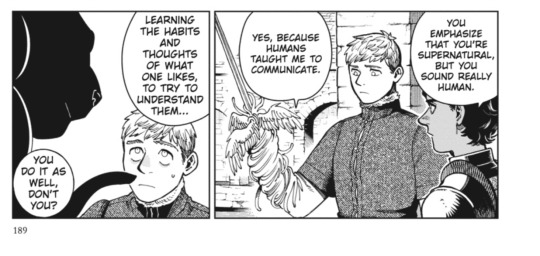
Kabru is a character who devotes a huge amount of time and effort to understanding people, and he is very good at it. In his internal monologue, we can tell how advanced and complex his skills of analysis are. He is able to read a huge amount of information just from looking at people's faces and body language.


People are, to him, what monsters are to Laios. This is something that's been expanded on at length in other, excellent meta. It's the fact that they're foils; it's the fact that Kabru is also very easy to read as autistic, with a special interest which is the opposite and parallel of Laios'. It's something that came out of trauma and alienation, as Laios' special interest in monsters also began as a coping mechanism.
The complicated origin of this "love" for monsters and for people comes through, I think, in the fact that one of the places we see both characters use their fixation is in being very, very good at killing the thing that they love. This also ties into the idea that loving something isn't even remotely mutually exclusive with using it to sustain your own survival; using it for your own purposes; hurting it or killing it. Love can be, and often is, violent, possessive and consumptive. This understanding is part of what makes Kui's depiction of interpersonal relationships so compelling to me.
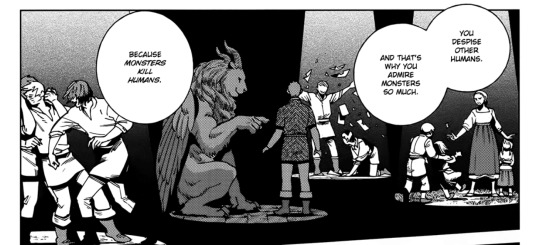
While Laios fixated on monsters and animals to seek a place of escape, in both his imagination and his self-image, from the humans who he couldn't understand and who couldn't understand him, Kabru seems to have fixated on understanding people in order to navigate the complex, socially marginal places that he has been forced into throughout his life. As an illegitimate child raised by a single mother with an appearance that marked him out as different to the point his father's family wanted to kill him, and a tallman child raised among elves who didn't treat him as fully human and wanted him to perform gratefulness for that treatment – treatment that, after he met Rin at age 9, he certainly always understood could be a lot worse – his ability to work out what people wanted from him, whether they were friendly or hostile or had ulterior motives, wasn’t just an interest. It will have been an essential skill.
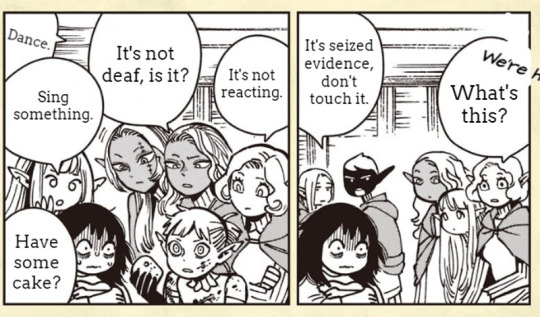
Milsiril, I think, was a flawed parent who tried to do her best by Kabru and did a lot of harm to him despite her best intentions. She may have treated him much better than an average elf would have, but like Otta and Marcille's mother, there are other elves with different outlooks on short-lived races. How would they judge her treatment of him? We don’t have any insight on what it could be, but to be honest, the person’s whose opinion of her I’d be most interested in knowing is Rin’s.
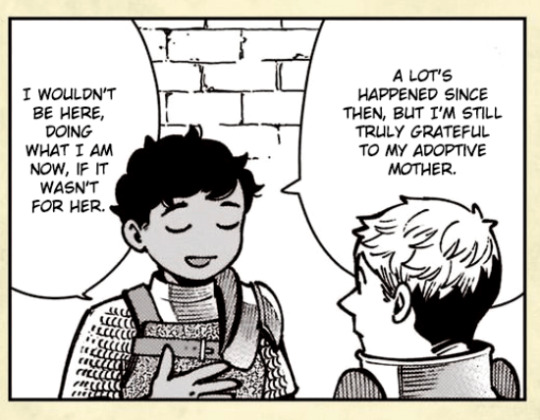
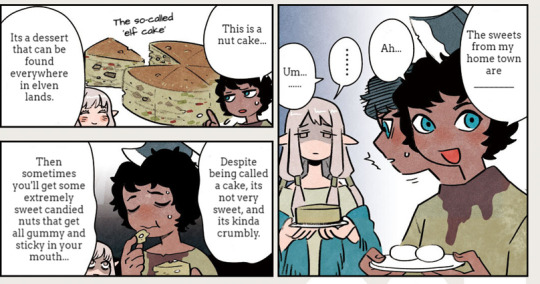
But even if she'd been perfect, living as an trans-racial adoptee in a deeply hierarchical nation with a queen who is a 'staunch traditionalist' who wouldn't even acknowledge the existence of a half-elf like Marcille (according to Cithis) is an experience that would deeply impact anyone.
Elves & Impossible mutual understanding
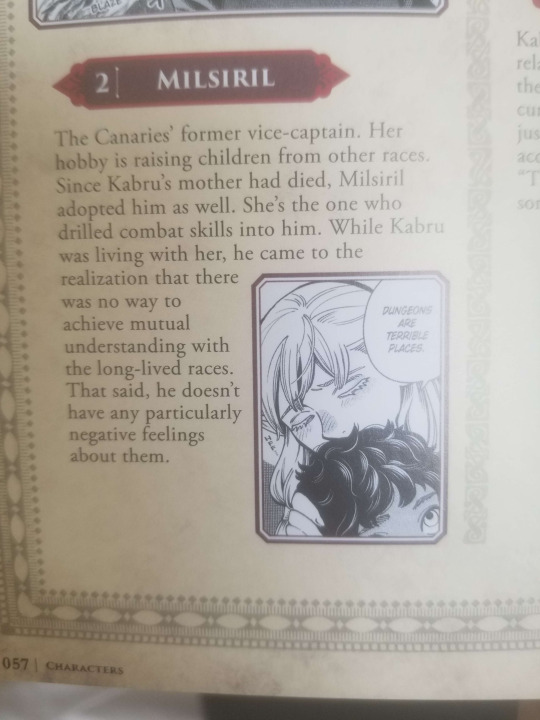
While Kabru was living with Milsiril - in other words, while living in the Northern Central Continent - he came to believe that "there was no way to achieve mutual understanding with the long-lived races."
This is evident in his political project: he wants short-lived races to have ownership over the dungeon's secrets. Despite his dislike of the Lord of the Island, he's a useful bulwark to stop the elves taking over. Despite his doubts about Laios, Laios needs to be the one to defeat the dungeon, because if he doesn't the elves will take over.
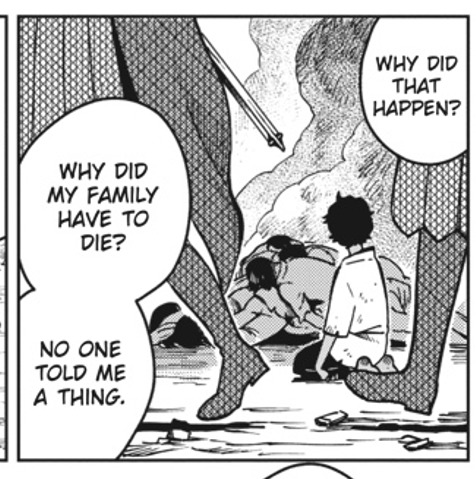
Kabru still carries a deep scar from Utaya, one that was exacerbated by the fact that he never got an answer to any of his questions about what happened or why. This, despite the fact that Milsiril knows about the demon and how it works. Do you think Kabru, with his social perceptiveness that borders on the superhuman, wasn't aware that she knew more than she would tell him?
Given that, the fact that he gets to a place where he "doesn't have any particularly negative feelings about [elves/long-lived species]" .... well, to put it bluntly, I believe that he thinks that's the case, but I kind of doubt it. After all, if he did have resentment, of Milsiril (someone who was his primary provider and caretaker since age six, and who despite her flaws, loves him and who I do think he loves) or of elves (who he has had to play nice with for most of his life, in order to survive, and will still have to play nice with in order to achieve his goals, since they hold all the power) what would that do except hurt him and make his life harder? Kabru is Mr. Pragmatic, so I don't think he'd let himself acknowledge any such feelings he did have. Exactly because he can't acknowledge them, they're well placed to get internalised as beliefs about the Fundamental Unchangeable Nature of the World.
However, these stated beliefs seem to contradict his actions. Despite his belief in the impossibility of forming a mutual understanding, he certainly seems to try to understand long-lived people, just as much as he does short-lived people. There's no noticeable difference between his treatment of Daya & Holm versus Mickbell & Rin that isn't clearly down to their relationship with him. His skills of human analysis were honed and developed while living amongst elves, and as soon as he's alone with Mithrun he immediately sets to understanding him - his interests, his motivations, his needs, and his past.
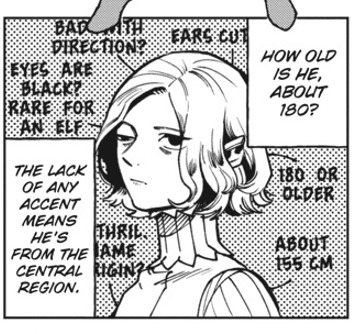
He treats him considerately and without bias, and despite the fact that Mithrun conquering the dungeon for the elves is both a reenactment of a core part of his childhood trauma and a political disaster for his aims, that doesn't seem to colour his perspective on Mithrun negatively at all.
This is something I find extremely laudable about Kabru, and it's another way he parallels Laios. He seems to understand that people, as a rule, (in Laios' case, he understands this about monsters - and eventually, all living beings) will act in their own interests, and if those interests conflict with yours, might harm you. But that's just their nature, and it's not something that should be held against them; you're also doing the same thing, after all. The crux of Laios' arc is precisely that he has to accept the responsibility of hurting someone else in order to achieve what he wants.
Kabru is deeply concerned with his own morals, what he should and shouldn't do, but mostly in the context of responsibility for the consequences - a responsibility he takes onto himself. He isn't scrupulous about what he needs to do in order to create the outcome he wants, but if he fails to create that outcome, then....
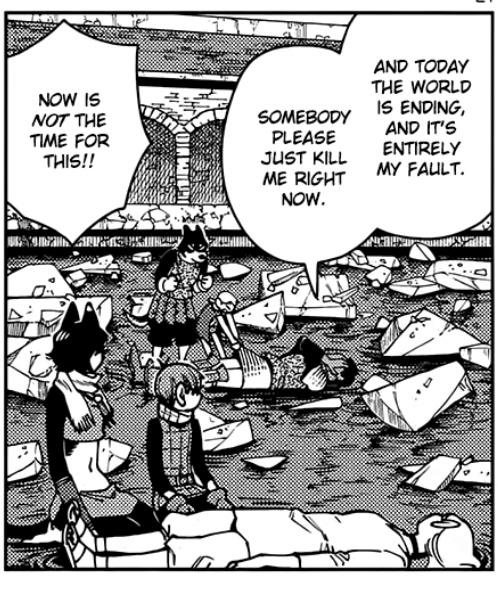
He blames himself to the point of thinking he should die. He doesn't blame Laios, or seem at all angry with him, despite concluding he should have killed him to prevent this outcome. That's because in his eyes, ultimately Laios was going to act according to his own nature, and it's Kabru's fault for not understanding that nature well enough. He's extremely confident in his ability to understand and predict others, (including elves and other long-lived people). Then, where does his conviction that mutual understanding is impossible come from?
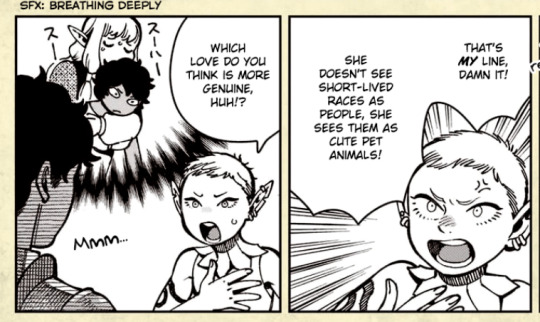
Partially, it's the "mutual" part. I'm sure Kabru, who isn't able or willing to deny Otta's insinuation that Milsiril saw him more like a pet than a son, has felt that his full interiority, the depth of his feelings and his ability to grow, act, and think as a fully equal being, was something that the elves around him just couldn't grasp. Because that was their excuse for it, he came to understand this as a gulf between short-lived and long-lived beings, an inevitable difference in outlook caused by their different lifespans.
This experience might be part of what leads to his iconic “fake” behaviour. He trusts his ability to understand others, but if they aren’t able to understand him, then there isn’t any benefit to being honest about his feelings and thoughts. If his attempts to reach mutual understanding with his caretakers were never able to be fulfilled, then it isn’t any wonder that he reacts with such surprise and horror at blurting out his desire to be Laios’ friend.
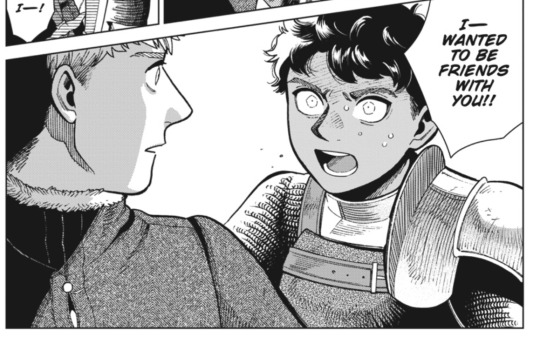
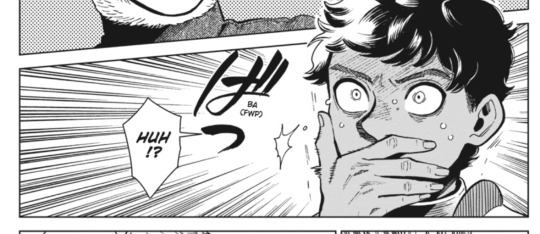
In his experience, making yourself vulnerable in that way only leads to being hurt. Soothing him, hushing him, lying to him, talking to him like a child that isn’t able to use proper judgement – that’s an inadequate and deeply hurtful way to respond to genuine distress, the desire for autonomy, or disagreement. Ultimately, I think that’s why he comes out on the side of being grateful to Milsiril; because she did equip him with the skills and knowledge he’d need to reach his goal, and let him go.
Though he could understand them, they couldn't understand him. To the extent that was true - which I'm sure it was - it wasn't due to anything about lifespan. It was due to the elves’ racism, and the solipsitic mindset & prejudiced attitude that it caused them to approach him with.
Because, if it needs to be said, the idea that there is an unbreachable gap in understanding between the long-lived and short-lived species is not true. Marcille and Laios have a much greater difference in lifespan than any full elf from any short-lived person, and they’re able to understand each other – maybe not perfectly, but better than many other people who are closer in life-span to them.
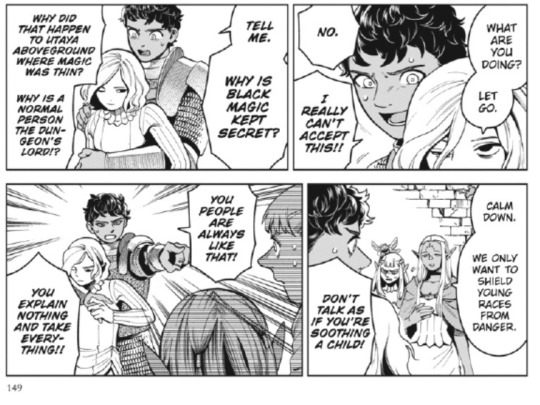
That doesn’t mean that I think Kabru is wrong about this, however. Because there’s an interpretation of his statement that is reflected in his actions and is true. When he talks about his problem with elves, it’s not just their attitudes: it’s their power, and what they use it to do. They “explain nothing and take everything”. Though it’s presented in the guise of ‘guiding and protecting’, in fact it’s a simple case of a powerful nation using their military power, wealth, access to resources, and historically stolen land – including the island itself – to protect their own interests and advance their own agenda. That’s why they’d be able to show up, seize the dungeon, and forcibly take Kabru’s party and Laios’ party to the West. If Kabru wants to stop that from happening, or change that status quo, persuasion or a bid to be understood would be completely pointless. Between the political blocs formed by long-lived species and the interests of short-lived species, “mutual understanding”, given their current, unequal terms, would be impossible. This is something that we see reflected in Kabru’s actions; before he asks his questions about the dungeon, he grabs Mithrun as leverage. He never really attempts to persuade the canaries to see his point of view, because that would be pointless: they’re agents of the Northern Central Continent’s monarchy, and will act in its interests regardless of any individual relationship with him.
I don’t think Kabru sees the different dimensions of this belief of his in quite such clear terms, however, as is evidenced by the other group who he thinks it’s impossible to communicate with.
Demi-Humans & Unknowable Objects
The other place that we see his conviction about the impossibility of mutual understanding is in the kobold extra.
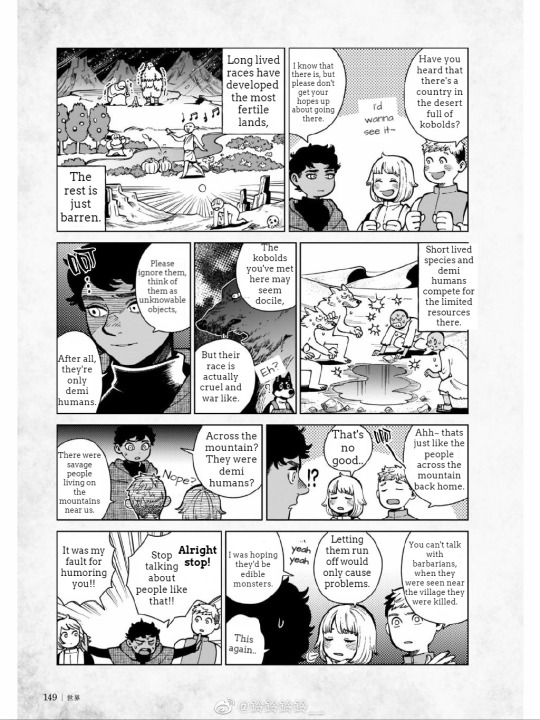
I'm including the whole thing, because I think it's an excellent and clever piece of world-building. Aside from what it says about Kabru, which I'll expand on shortly, what this extra does is deconstruct and call into question the usual "fantasy ontological biology" present in these sort of DnD-like settings. Essentially, the kind of worldbuilding where a race (such as kobolds) can be described as war-like, and that's establishing something essential about their biological nature. That's common to the point that if Kui didn't include this, some people would probably come away thinking that's the case about, e.g., the orcs.
But here, despite what Kabru is saying, the information the reader actually gets is:
the conflict between short-lived humans and demi-humans such as kobolds is mostly over access to material resources that they need to survive.
These resources are scarce because powerful nations, such as the elves, have monopolised them.
Kabru, who has grown up in a place at the centre of these conflicts, ascribes essential, negative traits to a cultural group which was in direct conflict with his own. Communication with this other group is impossible; they aren't people, they're more like objects.
oh yes! just like this conflict between groups of tall-men, a conflict which the reader will immediately interpret as more clearly analogous to real-life racism. Our other protagonists also carry prejudices from growing up in a place where a marginalised group was in conflict with the dominant group over scarce resources. It's definitely impossible to communicate with these people, and you can only kill them.
Woah, when you say it like that, it sounds pretty bad!
But also, nobody walks away having had a realisation or unlearned their prejudices - because they don't have the tools they need to do that work. Yet. I do think, to an extent, it could happen - especially with Kabru, since it's suggested in the epilogue that Melini might become a safe-haven for demi-humans.

To focus in on Kabru, the key here is his statement that you should think of demi-humans as "unknowable objects". Even his extraordinary powers of understanding have seemingly hit a limit. Part of this is just inherited prejudice, and doesn't need to have a complicated psychological explanation, any more than the elves who were prejudiced against him need one.
But also... this is probably somewhat linked to the way demi-humans seem to be considered "pseudo-monsters". They're the place that the strict delineation between the human and the monstrous is permeated. Laios, who is not interested in humans, remembers and is excited by Kuro. Chilchuck and Laios argue over whether it's OK to eat a mermaid. Kabru's prepared to (pretend to) roll with the idea that Laios ate the orcs.
But these are people, aren't they? Of course, this is a social construction, as we see from the fact that in the Eastern Archipelago, the label of "human" is reserved for tallmen, but in most of the rest of the world it depends on some obviously arbirary classification based on number of bones; "demi-humans" aren't in any essential way monstrous, except to an extent in their appearance, and physical location - due to their marginal social status, they're pushed out to live in unsafe places such as dungeons.
Therefore, Kabru's view of demi-humans as fundamentally "other", unable to be understood - monstrous - could be read as akin to abjection, the psychoanalytical concept described by Julia Kristeva. In order to create a bounded, secure superego, that thing which permeates and calls into question the border between self and other, human and animal, life and death, is rejected and pushed to the margin.
“Not me. Not that. But not nothing, either. A "something" that I do not recognize as a thing.[...] On the edge of nonexistence and hallucination, of a reality that, if I acknowledge it, annihilates me. There, abject and abjection are my safeguards. The primers of my culture.” (Kristeva et al., 1984, p. 11) “It is thus not lack of cleanliness or health that causes abjection but what disturbs identity, system, order. ” (Kristeva et al., 1984, p. 13) “The pure will be that which conforms to an established taxonomy; the impure, that which unsettles it, establishes intermixture and disorder. [...] the impure will be those that do not confine themselves to one element but point to admixture and confusion.” (Kristeva et al., 1984, p. 107) (discussing food prohibitions in Leviticus)
This is both (due to its affinity with food-loathing and disgust) a very fruitful concept to apply to dunmeshi, and a psychoanalytical theory which I wouldn't exactly cosign as True Facts About Human Psychological Development. You may also know the abject from its utilisation in the classic essay "Horror and the Monstrous-Feminine" by Barbara Creed - that's a lot more approachable than Kristeva if anyone's interested.
Key here, though, is that through the symbol of the "demi-human" is embodied a step between "human" and "monster" - and that's a prospect that puts at risk the whole notion of an absolute separation between those two categories in the first place. To Laios, that's something wonderful, and to Kabru, it's terrifying. We can see this principle further embodied in the relationship both characters have with the notion of becoming monstrous.
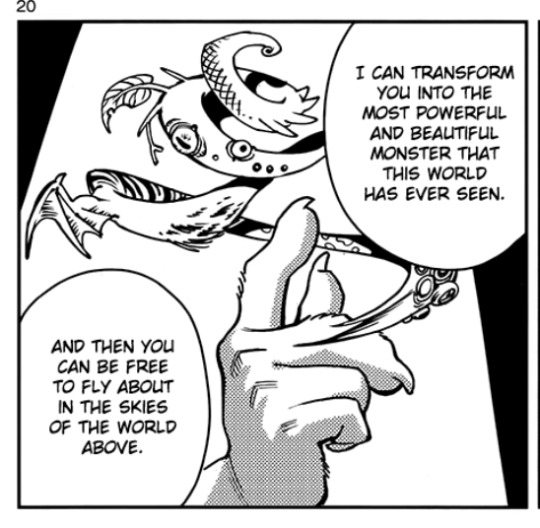
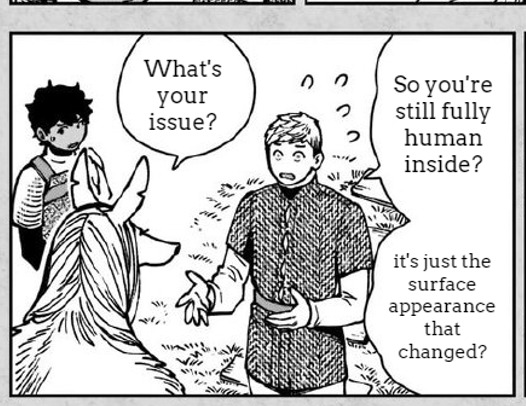
To Laios, this is transcendent, and represents a renunciation of everything human - in fact, if it didn't, it wouldn't "count".
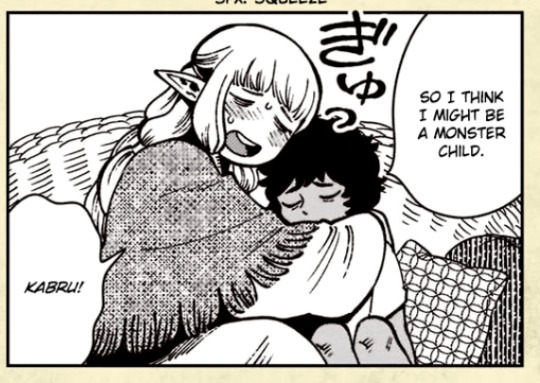
To Kabru, it's a deeply-held fear, established by his childhood alienation (due to his illegitimacy, his eyes, and perhaps also his neurodivergency), deepened by monster-related trauma and the sense of responsibility and survivors guilt he feels for what happened at Utaya. His identity as a human who is not monstrous is key to his sense of stability and safety; he doesn't want to touch monsters, he doesn't even want to see them.
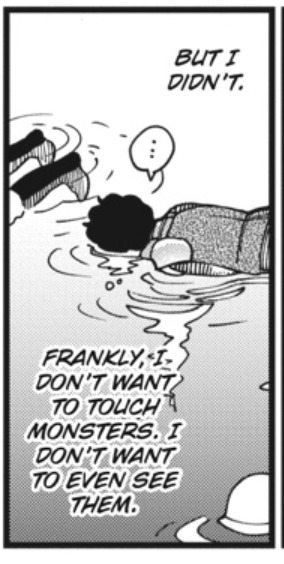
To acknowledge a kinship, a possibility of similarity between the things he loves (humans) and the things he hates (monsters) would be more than touching them - it would be putting them inside him. We know, quite explicitly, that this notion is triggering to Kabru. He literally has what seems to be a flashback when he's about to eat the harpy omelette.
So he abjects it, classifying the demi-human as fundamentally unlike him - an unknowable object, or an object that he refuses to know. Because in understanding it, he would interject the things he hates and fears into his self, which is already, always under threat by that hated and feared object.
Of course, again, Kabru isn't very good at enacting this refusal in practice. For one, when he chooses between his desires and ingesting the feared object, eating monsters... he eats monsters. Part of this is treating himself badly, the "ends justify the means" mentality. His goal is to destroy all monsters, so if he needs to become monster-like to do that, he will. But part of it is also the other motivation that he didn't even seem to know about until he said it: he wants to become Laios' friend, and to learn from him how a person can like monsters. He wants, at least in some part of him, to reconcile the feared and hated object into something he can understand.
For another:
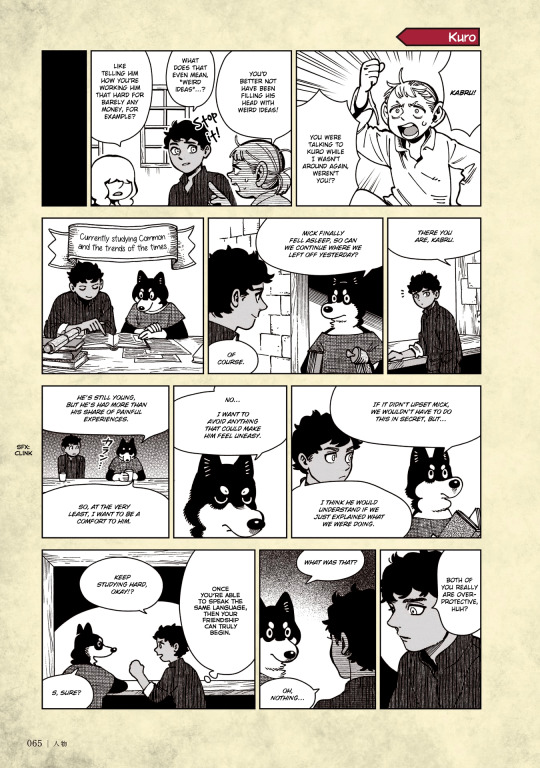
Kabru can speak the kobold language. In the first place, while this may have been common in Utaya, it also could have been something he chose to learn, an early expression of his interest in understanding and talking to all sorts of people. It isn't the kind of thing you learn if you believe that communication between yourself and the group that speak it is impossible, is it?
It's possible to harbour prejudices against a group while being kind to an individual, and given Kabru has those prejudices regardless of his reasons, that is what he is doing. But also, his treatment of Kuro doesn't reflect a sincerely held belief that he's an "unknowable object" at all. His approach is exactly the same as it is to any other person: an analysis of goal and motive, and an attempt to help if he's sympathetic and their goals align - going out of his way to give language and local knowledge lessons in secret. His conviction that Mickbell and Kuro will truly become friends when they can properly communicate is completely contradictory to any sense of demi-humans as fundamentally different, or impossible to reach mutual understanding with. To me, it seems like this self-protective shield against the corruptive force demi-humans as an idea present to his identity, this abjection, when Kabru is face-to-face with one, just simply can't hold up against his finely honed skill of intellectual empathy. Perhaps because he's autistic, it seems his "empathy" is less an emotional mirror response, and more a set of cognitive skills for analysis of others. That instinctual, emotional empathy might not trigger when presented with a member of an out-group, but if it’s possible for Kabru to turn his cognitive empathy off, we don’t see him do it.
This isn't to say that this prejudice doesn't affect his behaviour. For one, it could negatively impact his judgement of politics and policy, where individual people don't enter into it. For another, I'm not convinced he'd be willing to overlook Mickbell's exploitative relationship with Kuro if Kuro wasn't a kobold. As it is, since both of them are satisfied, he doesn't feel like he needs to intervene, regardless of the fact Mickbell isn't paying Kuro. But if Daya and Holm were in a relationship, and Holm took both Daya's and his own share from their ventures, but only compensated her in living expenses and kept the rest, do you think he'd tolerate it, for example? Even if she said it was OK?
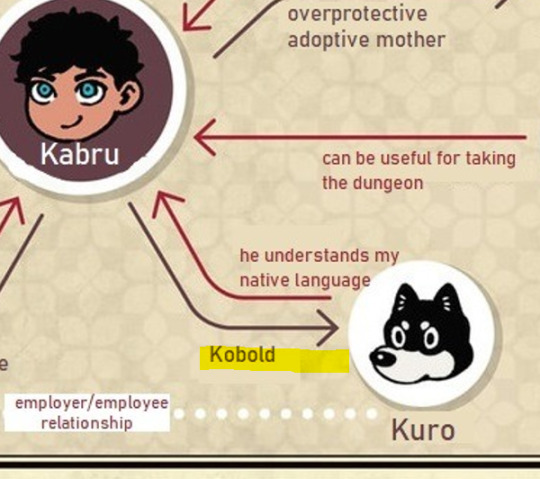
Conclusion

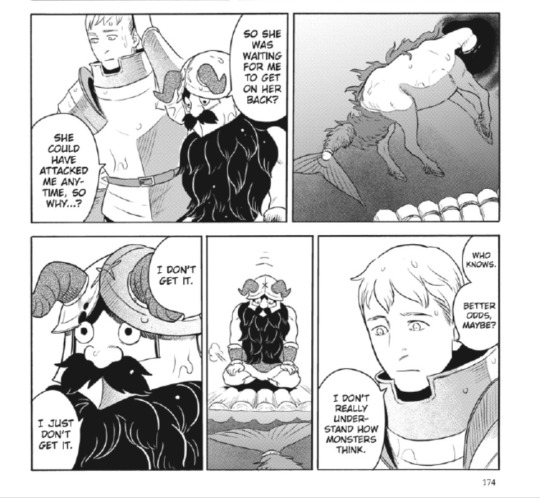
The kelpie chapter establishes that "people can never know what monsters are really thinking." That isn't just true of monsters, though.
True mutual understanding is impossible - between anyone. We can never truly understand another person's heart. This is touched on in, for example, the existence of shapeshifters and dopplegangers. Even a monster that seemed like a perfect copy of a person wouldn’t be that person, and wouldn’t be a satisfactory replacement.
We’re intended, I think, to understand the winged lion's repeated suggestions to just replace people who have been lost with copies as something uncanny, which demonstrates the way that the winged lion never manages to attain a complete understanding of humans. A version of a person who was created to fulfil your memories of them, to be the person who you wanted them to be, would be a terrible, miserable thing.
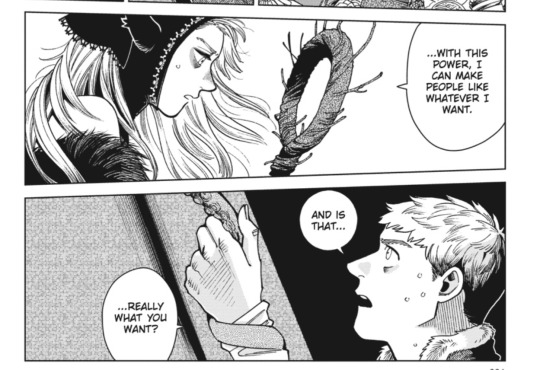
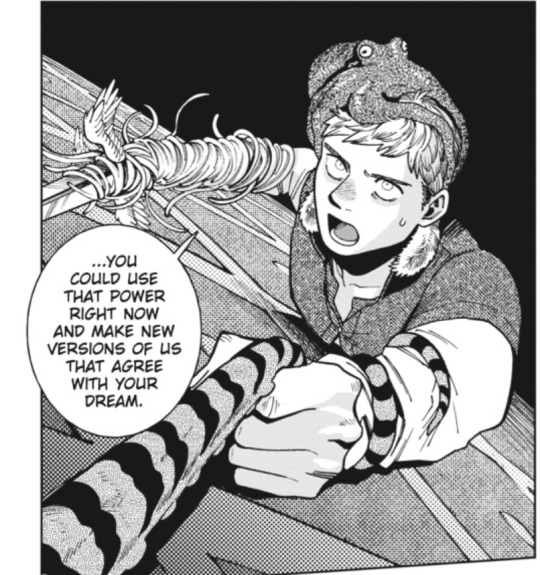

Disagreeing, coming into conflict, and misunderstanding each other, are essential parts of what it means to be living beings, as fundamental as the need to eat.
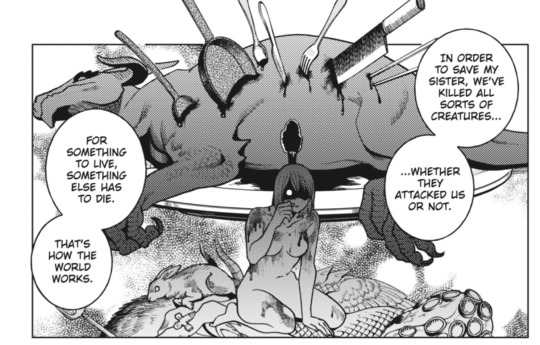
The only thing to do is not to take more than you need to eat to survive, and not impose your own desires onto others. To do your best to sincerely communicate your desires, even if they're embarrassing or vulnerable or strange, like Kabru eventually does with Laios; like Laios does, bit by bit, with the people around him; like Marcille does, Chilchuck does, Senshi does... to hope they will accept you, and do your best to understand them in return.
We can re-examine, in that context, Kabru's line about the elves' tendency to "explain nothing and take everything".
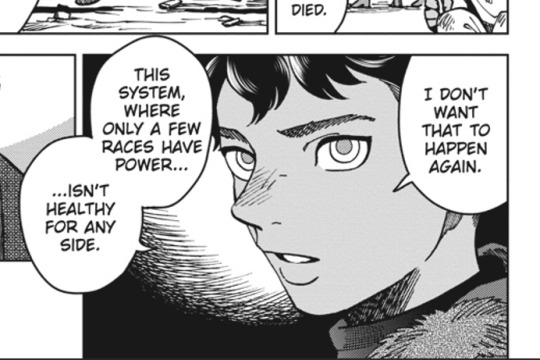
They have the power to impose their preferred "menu" onto less powerful groups. And in that context, mutual understanding being impossible just means that they won't give up their power because they're asked nicely. Kabru's goal is to seize the truth that they won't give to him, and to create a situation where they can't take everything. Because he's accurately surmised that nothing about the treatment of short-lived races will change so long as the power imbalance remains. Despite the way he mistakenly ascribes part of that to "long-lived vs short-lived" or "human vs demi-human", the actual gulfs in understanding he identifies are structural, are about power and about access to material resources and safety.
I think he could come to recognise this. Yaad is teaching him political science after all, and while a prince's lessons on political science won't exactly get at much that's radical or invested in the interests and perspectives of the marginalised (Capital is a critique of for a reason after all...) I believe in Kabru's ability to learn critically and get more from a lesson than it was intended to teach.
#og post#kabru of utaya#kabru dungeon meshi#laios touden#dungeon meshi meta#dungeon meshi#dunmeshi#dungeon meshi manga spoilers#dungeon meshi analysis#kuro dungeon meshi#the canaries#milsiril#continuing to develop my kabru theses.#literally sitting and thinking about kabru all day. rotating him.#he's in the microwave. to me.
2K notes
·
View notes